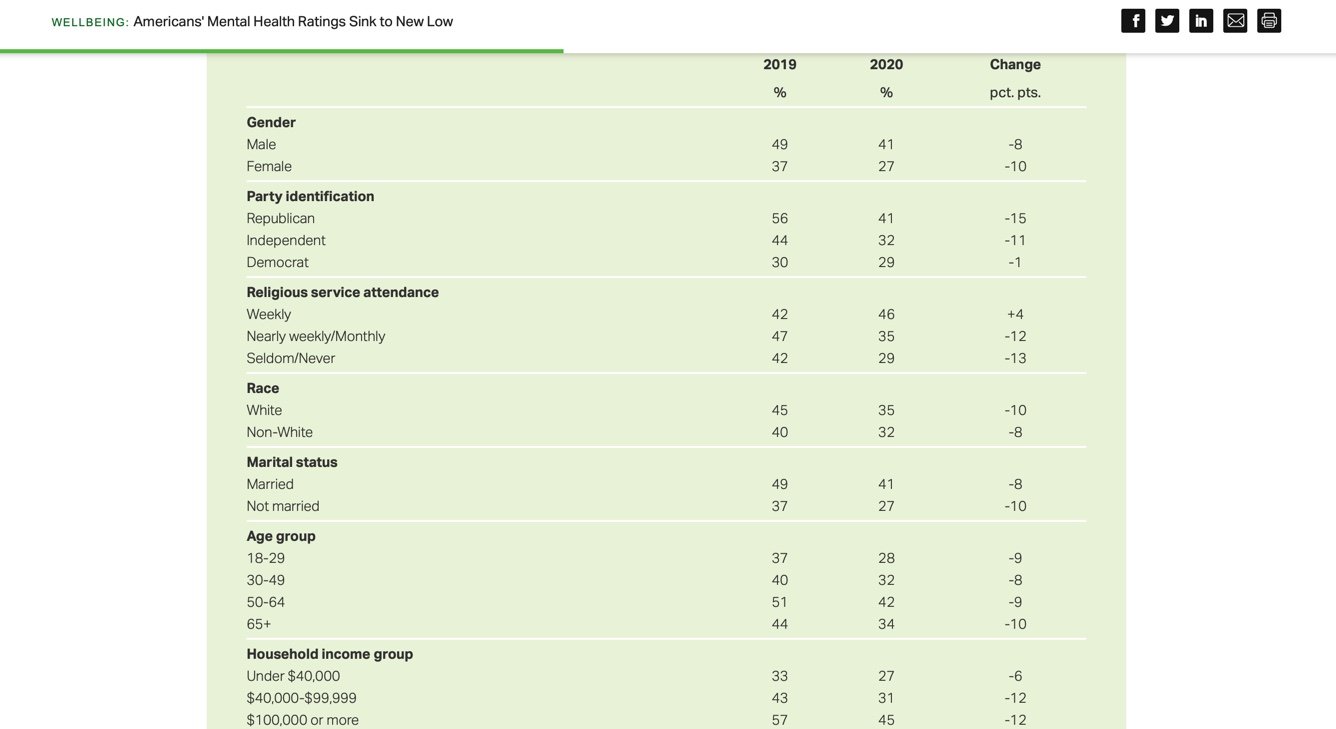Every year since 2001, the polling and data company Gallup, Inc. has conducted a November “Health and healthcare” survey. The poll asks Americans to assess their own mental and physical well-being by the categories “excellent,” “good,” “fair,” or “poor.” These are qualitative measures and obviously relative. But the fact that they have been polling about this topic lends credence to the overall trends from year to year.
In this year’s Health and healthcare survey, Americans rated their mental health at its lowest in the last two decades. This is not surprising. There are more than a few reasons for feeling like you are on the verge of cracking up. To wit: a complete shutdown of normal life for a couple months; near total isolation from other people; fear of imminent death; the closing of thousands of small businesses and personal financial hurdles; the stress of schooling kids at home in front of a screen while also working a job in front of a different screen. Add to this the most controversial election season of our lifetimes along with race riots all summer and you have a bouillabaisse of mental strain stew that we are all slurping down every day (some are sipping it, paying little attention to the news and social media; others are gulping it by the gallon by doing the opposite).
The decline is reflected in every single category save one, and one only. The survey distinguished between a host of categories: political affiliation, tax bracket, sex, age, race, church attendance and marital status. Rich or poor, male or female, Democrat or Republican, married or single, all declined in self-assessed mental health. The one and only category of people whose mental health actually improved in 2020? Weekly church attenders. In a column of 100% negatives save one, the positive was for those who attended church on a weekly basis. (Sidenote: Believe me, I was doing 40-something-terrible-form cartwheels when I read this).
An interesting question (at least to me) is why? Why would those who go to church every week through the most difficult year in our lifetimes actually improve in their mental health in 2020 from the year before? Here are a few possible reasons:
- In a desert of isolation, weekly church has been a desperately needed oasis of loving community and deep relationships.
- In a time of instability and fear, the weekly message of hope in Christ brings peace and strength.
- God knows what He is doing. When he commands His people to gather weekly for worship, He does it for our good as well as His glory, and it actually, practically helps us.
Now hear this: I am neither criticizing nor pressuring livestreamers. I repeat: I am neither criticizing nor pressuring livestreamers. As has hopefully been made clear through our livestream worship option, virtual small groups, virtual men’s and women’s Bible studies, online prayer options, virtual check-ins, etc., we are making many efforts to build deeper community with all of NAPC through a tough year.
Nor am I trying to bind your conscience to say that you should be attending church on a weekly basis during the pandemic. For those who have a deep conviction that staying home instead of coming to worship in person on Sundays is the more wise choice, I am not attempting to persuade you differently. If you are staying home, make the most of it! I know that a substantial number of NAPC families are faithfully worshiping together every Sunday. They cut out distractions, get to their family room early and they sing and pray and hear the Word together. This has, I am sure, borne much fruit in faith and family togetherness. Praise God for technology and the discipline to worship weekly even when you aren’t in the worship space!
For those who are on the fence, or who have relaxed their criteria of isolation on some things (sports, dinners out) but not others (church), I encourage you to give it a try and come worship with us in person. Nobody will look at you and say, “where have you been?!” Actually some might say that, but if they do it will be said in love because we missed you.
Eventually this will come to an end, and we will be released from captivity so to speak. That is the time for which I want us to prepare. I hope and pray you will commit beforehand to returning to worship in person. We will continue to livestream our services to reach the homebound and new folks. We will not livestream for the purpose of keeping you in your PJ’s at home while making eggs. Livestream will shift from being a pandemic tool to an outreach tool, not a mechanism for convenience. God’s people are made to be together.
Public, gathered, weekly worship – it might be the best thing for your mental well-being out there!
Pastor David


